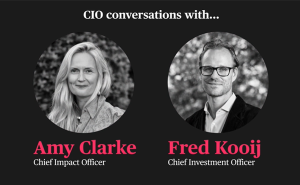COVID-19 – the ultimate test of our investment thesis

At Tribe, our focus the last few weeks has been to look after our employees and communicate with our clients. We have been doing what every asset manager should in times of turmoil; dig deep into their book of investments, test and re-test their investment thesis and consider what factors have changed for the worse, for the better, and what has not changed at all.
It is too early to talk about performance through this market turmoil – we are long term investors – although our year-to-date numbers look promising on a relative basis. Away from Q1’s performance figures, we are gathering more and more evidence that the current market sell-off could mark a catalytic moment in the reassessment of the role impact investment can, and should, be playing.
COVID-19 is providing a tragic, yet timely reminder of our responsibilities as citizens both within our community and globally; nature and society can only remain imbalanced for so long before the pendulum swings back. We benefit enormously from the “north star” of our investment framework – the United Nations Sustainable Development Goals (SDGs) – which are the internationally agreed targets to provide a minimum standard of living, quality of life and equal opportunity, with the theme of environmental stewardship deeply entrenched.
COVID-19 offers stark evidence that respecting nature’s limits and respecting our community members are not nice to haves, without them we risk the decimation of the global economy. It should come as no surprise, therefore, that the sectors that focus in on basic rights or perhaps the “lower” hierarchy of needs – businesses like food, healthcare, education, shelter and communications – have held up relatively well. We believe that these are the businesses that society, as a whole, will seek to ensure are better invested in going forward. We expect that this crisis will ultimately demonstrate that the corporate short termism, which is profit only, is too narrow and not fit for purpose. We believe those companies who have already understood this and focussed in on their
Sustainability
Tribe’s investment approach leads to certain natural biases, which we believe have contributed to our historically strong investment performance pre COVID-19. Many managers talk about being invested in quality growth, which for us, really means investing in solutions-based businesses, working towards the delivery of the SDGs. From a financial and valuation perspective, these are businesses where a significant proportion of market cap is derived from cash flows being discounted a few years and beyond, where a one-year hiatus of activity shouldn’t affect the underlying valuation. On a more qualitative basis, many of the companies we back play naturally into are our secular themed sectors, which we strongly believe will be accelerated given this catalytic crisis of society and shareholder capitalism. As more stakeholders in society begin to discover the connection between COVID-19 and our neglect of nature’s carrying capacity, consumers will be galvanised in reassessing their choices, which we believe will accelerate demand for more sustainable options like electric cars, meat substitutes and organic food and
Renewable energy
A further outcome of our style of investing is what we tend to avoid. We are not as exposed to companies who are financially engineered, with significant amounts of leverage or substantial share buyback programmes. Equally, our preference for innovative businesses seeking new and sustainable solutions, steers us away from high dividend payers, which is sometimes indicative of a mature business defending a legacy market position. Already more than a dozen UK listed companies have cancelled their financial year dividends, removing a key pillar of these stocks’ valuation support.
One of the most common push backs we had heard from mainstream finance about impact investing is that it is a “fad”, or that a bubble has been forming and that as soon as this record bull run inevitably ends, the “sector”, its values and its valuations will be exposed. The early signs are that this has not happened. As society and the corporate world emerges from this crisis, there will be lessons learned. Companies will re-examine their purpose and culture as they assess their reaction to this sudden crisis – that is inevitable in the face of the scale and depth of challenge we have faced. As we work together to stabilise and kick start our economies, will it be “Business As Usual” or will we take this opportunity to re-imagine business models and investment paradigms to be future fit? Only time will tell.




